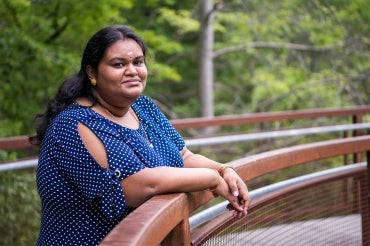'This has been home': U of T grad helped build an on-campus community amid COVID-19

Published: June 10, 2022
Ilakkiah Chandran, the second-born in a tight-knit trio of siblings who all studied at the University of Toronto Scarborough, says it's natural to share knowledge in her family and support one another.
In university, where she studied psychology, neuroscience and biology, she wanted to help create a similar sense of community and camaraderie among students.
“I didn’t want students to be afraid to ask for help. The purpose of a community is to be helpful and supportive. You don't always have to carry all the work,” says Chandran, who is graduating this June. “I wanted to pass on what I've been receiving.”
During the pandemic, she co-led a team of students that revived and revamped the Psychology Neuroscience Departmental Association (PNDA), an on-campus, student-run organization that hosts events and connects students in the department. Chandran wanted the group to offer everything that helped her throughout her education – mentorship, academic opportunities and, above all, a community.
“I really struggled with networking with professors. It's hard to go up in front of the entire class and just have a conversation with a professor,” says Chandran, a self-described introvert. “We wanted to create an environment where faculty can step out of their teaching roles and sit down with students.”
That’s why she co-founded Tuesday Talks, the PNDA’s networking program that bridges the gap between students and faculty. Hosted on Zoom, many talks ended up being personal conversations, about how professors ended up in their field and why, or the most interesting anecdotes they’d picked up along the way. It was a chance for students to see professors as people, and vice versa.
Chandran became fascinated with research studies in her first year but wasn’t sure how to start her own. While she eventually figured it out – and went on to complete several self-directed research projects – she founded the Academic Research Panel to make the process easier for others.
The two-day virtual conference invited professors from all U of T campuses to present their research and answer questions from students, who had opportunities to volunteer at the event. For half the conference, students shared their own research, which the PNDA then published. More than 150 people attended.
“The part I really loved about that was that students were watching other students, and it didn't feel like research was so far away,” she says. “Then we partnered with an external organization to publish an abstract booklet with all their research. It was a great addition to their resume and something tangible for them.”

Ilakkiah Chandran recently added a University of Toronto Student Leadership Award to her list of accolades (photo courtesy of Chandran)
Beyond the group, Chandran has been volunteering and researching, with many projects focused on mental health, accessibility and amplifying racialized and marginalized voices. As a representative for U of T Scarborough’s health and wellness centre, she brought suicide prevention training to the PNDA. She’s developed search strategies for databases that highlight experiences of gender-diverse parents, investigated how the pandemic exacerbated racial inequities in Canada and spearheaded think tanks on self-esteem and social media in Toronto.
“It's about balance. It may seem like there's a lot to my resume, but the passion I have for these things always outweighed how many tasks were involved.”
The PNDA is still going strong, with more than 1,000 followers on Instagram and ongoing events. Chandran already has a job at Unity Health Toronto, where she researches alongside physicians and health-care professionals.
“I decided to take it slow and figure out what exactly I want to do in the coming years,” she says. “I'm going to continue volunteering, and hopefully stay engaged with U of T Scarborough, because this has been home.”



